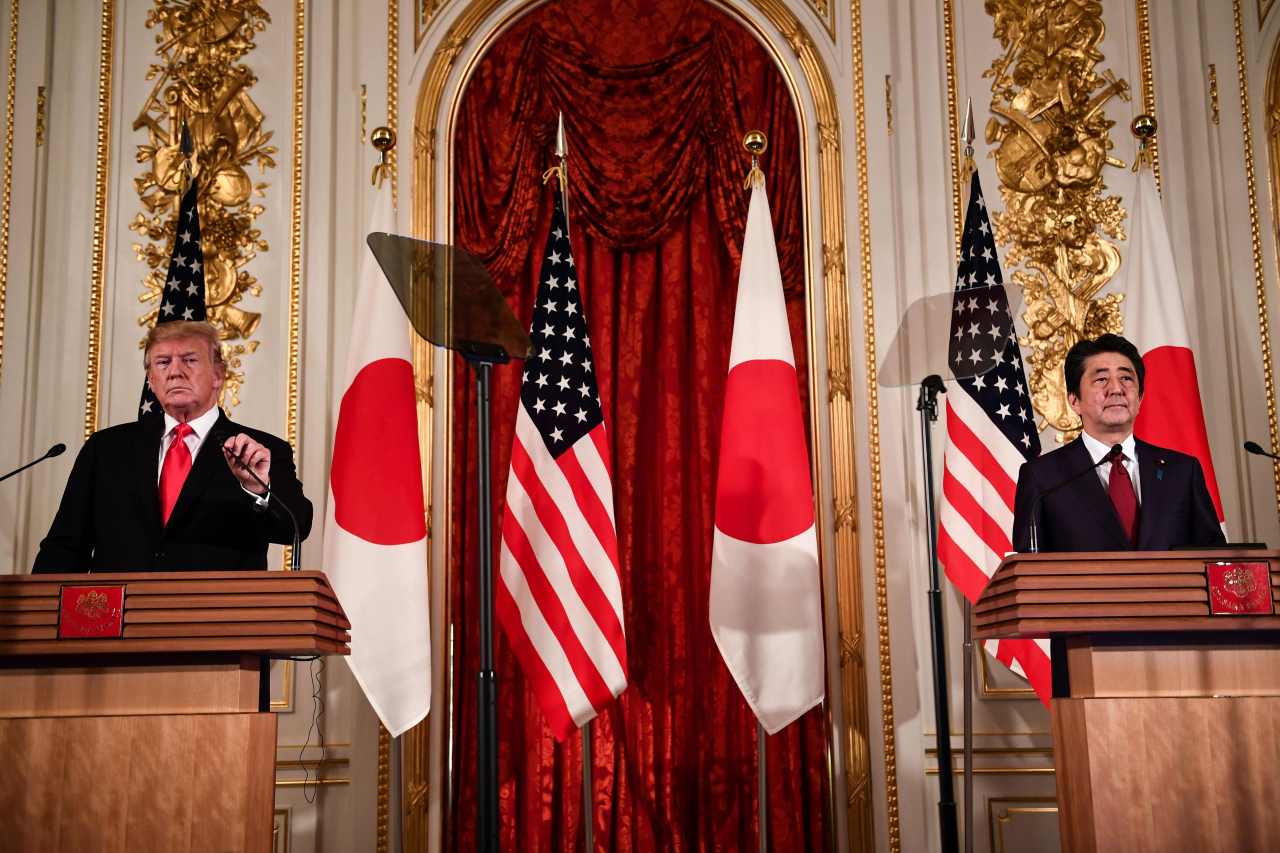May 29, 2019
Trump’s recent comments on Kim Jong-un suggest a difference between the president and his aides.
US President Donald Trump appears to be taking a different tack on North Korea from his advisers and also from Japan, sending mixed signals about US-North Korea relations and dialogue prospects.
Speaking before and after his summit with Japanese Prime Minister Shinzo Abe in Tokyo on Monday, Trump reiterated his views on North Korea’s recent provocations and on its leader, Kim Jong-un.
 |
“I think he’s very much — I talk to him a lot about it, and he’s very much into the fact that — he believes, like I do, that North Korea has tremendous economic potential like perhaps few other developing nations anywhere in the world,” Trump said.
“He knows that, with nuclear, that’s never going to happen. Only bad can happen. He understands that. He is a very smart man. He gets it well.”
Trump was responding to a reporter’s question: what he would consider a breach of trust by Kim. The question was raised after Trump downplayed North Korea’s missile launch, saying it involved only “small weapons.”
The US president also stressed that North Korea had not conducted missile or nuclear weapons tests in the past two years, adding that he was happy with the development and that “intelligent people agree with me.”
Ahead of the summit, Trump also said there was “great respect” between Washington and Pyongyang and that he felt “lots of good things will come with North Korea.”
Such confidence does not appear to be shared by Japan, a key US ally in the region, however.
While Abe said he and Trump had dedicated “a good amount of time in better aligning our policies” on North Korea and that the two countries were “completely on the same page,” differences were apparent in their approaches to the North Korean projectiles.
“Now, the launching of the missiles this time: On the 9th of May, North Korea launched a short-range ballistic missile. This is violating the Security Council resolution,” Abe was quoted as saying in a White House transcript of the event.
At the press conference, Trump again downplayed the significance of the North Korean projectiles and implied that he did not view them as a violation of the UN Security Council resolutions, saying he and his aides held differing views on the matter.
Seoul, meanwhile, maintains that the identity of the projectiles fired May 9 remains to be clarified.
A high-level Cheong Wa Dae official on Monday told reporters that it is unclear why US national security adviser John Bolton referred to the projectiles as ballistic missiles, adding that analysis was still underway.
With UN Security Council resolutions banning North Korea from launching any ballistic missiles regardless of range, Seoul has been careful not to use the term ballistic missiles in referring to the recently launched weapons.
President Moon Jae-in referred to the projectiles using a Korean word that sounds similar to “ballistic missiles” at a meeting with South Korean and US military commanders, only to have Cheong Wa Dae downplay the slip by saying he had misspoken.
While Trump continues to defend his assessment of North Korea, a local daily said the US had raised the issue of tritium facilities during the Trump-Kim summit in February.
Citing unnamed sources, local daily JoongAng Ilbo claimed Stephen Biegun, the US special representative for North Korea, had raised the issue with North Korean Vice Foreign Minister Choe Son-hui.
According to the daily, Biegun asked Choe if tritium facilities would be included among those to be shut down, as Trump was leaving the summit venue. Choe was unable to answer the question, according to the daily.
In an earlier interview with Fox News, Trump revealed that had Kim offered to shut down one or two of North Korea’s nuclear facilities at the Hanoi summit. Pyongyang operates five facilities.
North Korea, meanwhile, is taking an increasingly vehement tone against US officials, including Bolton, while refraining from criticizing Trump.
On Monday, North Korea’s Foreign Ministry spokesperson criticized Bolton over his comment that North Korea had fired short-range ballistic missiles in clear violation of UN resolutions.
Speaking on North Korean state-run television, the spokesperson called Bolton “ignorant” and accused him of being a “fanatic of war.”
“(Bolton) is not a security adviser but a security-destroying adviseor who destroys peace and safety,” the North Korean official said, accusing Bolton of devising policies favoring regime change and pre-emptive strikes against the North.
“It is not strange that twisted words are uttered from the mouth of a man who is structurally defective. Such human defect should (make him) scarce as soon as possible.”
North Korea has also attacked former US Vice President Joe Biden, referring to him as a “low IQ” individual, much to Trump’s delight.
In a Twitter message posted after North Korea’s attack on Biden, Trump wrote that he “also smiled when he called Swampman Joe Biden a low IQ individual, & worse. Perhaps that’s sending me a signal?”
Trump defended his comment when asked if it gave him pause to appear to side with Kim, saying he agreed with the assessment that Biden was a “low-IQ individual.”


